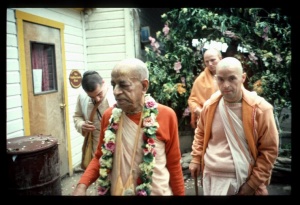CC Adi 17.213

A.C. Bhaktivedanta Swami Prabhupada
TEXT 213
- grāmera ṭhākura tumi, saba tomāra jana
- nimāi bolāiyā tāre karaha varjana
SYNONYMS
grāmera — of this town; ṭhākura — the ruler; tumi — you; saba — all; tomāra — your; jana — people; nimāi — Nimāi Paṇḍita; bolāiyā — calling; tāre — unto Him; karaha — do; varjana — the punishment of making Him leave the town.
TRANSLATION
“‘Sir, you are the ruler of this town. Whether Hindu or Muslim, everyone is under your protection. Therefore please call Nimāi Paṇḍita and make Him leave the town.’
PURPORT
The word ṭhākura has two meanings. One meaning is “God” or “a godly person,” and another meaning is kṣatriya. Here the pāṣaṇḍī brāhmaṇas address the Kazi as ṭhākura, considering him the ruler of the town. There are different names by which to address the members of different castes. The brāhmaṇas are addressed as mahārāja, the kṣatriyas as ṭhākura, the vaiśyas as śetha or mahājana, and the śūdras as caudhurī. This etiquette is still followed in northern India, where the kṣatriyas are addressed as Ṭhākura Sāhab. The pāsaṇḍīs went so far as to request the magistrate, or Kazi, to have Śrī Caitanya Mahāprabhu expelled from the town because of His introducing hari-nāma-saṅkīrtana. Fortunately our Hare Kṛṣṇa movement all over the world, especially in the civilized world of Europe and America, has become very popular. Generally no one complains against us to have us removed from a city. Although such an attempt was indeed made in Melbourne, Australia, the attempt failed. Thus we are now introducing this Hare Kṛṣṇa movement in great cities of the world like New York, London, Paris, Tokyo, Sydney, Melbourne and Auckland, and by the grace of Lord Caitanya Mahāprabhu everything is going on nicely. People are happy to accept the principle of chanting the Hare Kṛṣṇa mantra, and the result is most satisfactory.